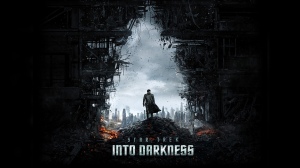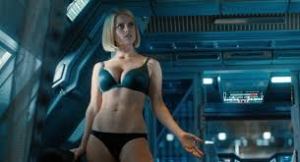2009's Star Trek reboot is one of the most entertaining films your reviewer has ever witnessed. I was familiar with director J.J. Abrams from his TV show Alias and (briefly) Lost, both of which were sort of fun but had the infuriating habit of endlessly deferring resolution like a proffered yet ever-receding carrot. Star Trek showed me that Abrams could actually tell an interesting and more-or-less coherent story when he wasn't incentivized to draw things out foreeeeeeeeeeeever.
Star Trek was designed to be like the original, Shatnerian series, but rewritten for teenage boys. Everything got faster, bigger, explodier, and everyone became better at what they do. Abrams turned it up to 11. Example (be warned that while I try not to give away anything too significant, this review does contain spoilers to both the first and second Abrams films): the opening sequence of the 2009 film goes from zero to captain-kamikazeing-ship-while-his-wife-gives-birth-to-protagonist-on-escape-pod in something like 90 seconds.
Star Trek: Into Darkness uses the same formula, but more so. Example: in the original series, Kirk et al would pretty regularly beam down to a low-tech planet, walk around a bit, and chat with the natives. Our introduction to Kirk in Darkness, on the other hand, involves him sprinting (his usual method of locomotion in the rebooted series) away from natives off the edge of a cliff. Spock, meanwhile, is swinging around the inside of an angry volcano (this is a sly nod to his introduction in Star Trek: The Motion Picture, where he's meditating in front of a volcano on Vulcan).
Whatever you may think of Abrams' "What if we did that again, but with explosions?"-approach to the series, I claim that Darkness is marginally superior to its predecessor. The plot's tighter (i.e. things which happen later follow logically from things which happened earlier, rather than e.g. Spock the Elder showing up for no apparent reason halfway through the film to deliver exposition and return Kirk to the main storyline), both technically and thematically; the humor's funnier (they've really nailed, especially, Spock's bone-dry quips); the pacing is almost perfect, aside from Abrams' compulsion to fill the space between action scenes with other action scenes ('OMG there's a bomb! OMG!...oh, ok. I guess they diffused it, and now we're back to what was happening before that'); the main cast is entirely satisfactory, and Cumberbatch's performance is as fantastic as I'd hoped (a much better deployment of his talents than Sherlock's irate autist*).
*(By no means do I intend to poke fun at autism; I only note that, like half the detectives on TV, Sherlock's Sherlock is written pretty much explicitly as an autistic savant. It's a formula.)
The best thing by far about this film, on the other hand, is the subtextual commentary on the War on Terror. If you happen to have seen Iron Man 3, you will have noticed that it's essentially the War on Terror as told through Marvel mythology. Well, Darkness is similarly concerned with pointing out to viewers that, "Hey, maybe we shouldn't have invaded Iraq, tortured POWs, and completely degraded the rule of law in our own country." The danger of being emotionally manipulated (SPOILER, but you figure it out pretty quickly anyway) by terrorism and cynical leaders underlies the entire film, but Kirk makes it explicit in a closing speech about how 'We can't let our anger about the murder of those we love drive us to revenge. That's not who we are.' The closing credits cement the message by dedicating Darkness to (I'm paraphrasing) the veterans of 9/11 and its wars.
Should you go see Star Trek: Into Darkness? Yes you should. Should you see it in 3D? That depends on whether you want to see a movie or a cardboard puppet show. Should you notice that at least two of this year's utterly mainstream summer blockbusters are fundamentally about Americans' weariness of their government's manipulative cynicism?
Yes. Yes you should. Occupy Star Trek.
Addendum: actually, the music is the best thing about either film. You're welcome. https://www.youtube.com/watch?v=Qu0QO1za64E





No comments:
Post a Comment